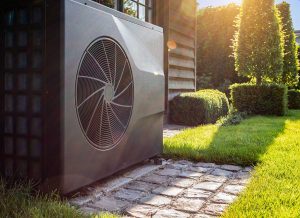Commercial Air Source Heat Pumps

What is an Air Source Heat Pump?
An air source heat pump, also called an air-to-water heat pump, extracts heat from the outside air and transfers it to water. This heated water is then circulated through radiators or underfloor heating to warm your home, and it can also be used to heat water stored in a cylinder for your taps, showers, and baths.
How Does an Air Source Heat Pump Function?
The system draws heat from the outside air into a fluid, which then passes through a heat exchanger within the pump. This process increases the temperature of the fluid, which is then used to heat water for your home.
Is an Air Source Heat Pump Right for My Home?
Air source heat pumps are adaptable to various home types and are the most widely installed heat pump system in the UK, with tens of thousands of homes already using them. To find out if this technology is suitable for your home, you can use our online tool, Go Renewable, to assess your options.
Types of Air Source Heat Pumps
Monobloc Systems
All components are contained in a single outdoor unit, with water pipes connecting to your home’s heating system and hot water cylinder.
Split Systems
The components are split between outdoor and indoor units.
Choosing between a monobloc or split system depends on factors like your budget and available space. Monobloc systems are usually less expensive and easier to install but may be slightly less efficient. Split systems can be more efficient since some heat transfer occurs indoors, where heat loss is minimized.
Space Considerations for an Air Source Heat Pump
You'll need an outdoor space where the unit can be mounted on a wall or placed on the ground with adequate clearance for airflow. If you have sufficient indoor space, a split system might be a worthwhile investment despite the higher cost. Your installer can help you determine the best setup for your home.
What if I Lack Outdoor Space?
If you live in a flat or a home without outdoor space, compact heat pumps are available that fit small, well-insulated areas. These units require only a cupboard-sized space near an exterior wall. Alternatively, an air-to-air heat pump could be suitable, especially for smaller properties like park homes or flats. For flats with shared services, communal heating solutions may also be an option.
How is Hot Water Stored with a Heat Pump?
Unlike combi boilers, standard heat pumps don't provide on-demand hot water, so you'll need a storage solution like a hot water cylinder. The size of the cylinder will depend on your household’s hot water needs and can typically fit into a cupboard with at least 80x80cm of space.
Additional Hot Water Storage Options:
- Hybrid Systems: These combine a heat pump for heating with a boiler for on-demand hot water.
- Heat Batteries: More compact than traditional hot water cylinders.
- Instantaneous Hot Water Heaters: These can be installed under a sink to provide smaller amounts of hot water.
Why Opt for an Air Source Heat Pump?
Considerations for Installing an Air Source Heat Pump
Before installation, consider these factors:
- Installation Costs: Typically around £14,000, though funding may be available depending on your location.
- Space Requirements: Not all homes have enough space for a standard air source heat pump and hot water cylinder, but there are options for smaller homes or those without outdoor space.
Cost of Air Source Heat Pump
Installation costs vary based on factors such as:
- The size of the heat pump.
- The size of the property.
- Whether it's a new build or an existing home.
- The need for adjustments to your heat distribution system.
Running costs will depend on how your heat pump is designed and operated. Savings on your energy bills will vary depending on the system you’re replacing and other factors like radiator size and electricity tariffs.
Available Funding
As of October 23, 2023, the UK Government’s Boiler Upgrade Scheme has increased the heat pump grant to £7,500 for both air and ground source heat pumps. Installation costs for air source heat pumps range from £2,400 to £14,050, with average prices between £6,500 and £11,500. Annual operating costs vary between £685 and £1,550, depending on the size of your home and your energy needs.
Commercial CHP Systems in the UK and Scotland
Combined Heat & Power Systems (CHP)
CHP Energy Systems in the UK
Electricity in the UK is typically generated at power plants with about 40% efficiency, which decreases further due to transmission losses by the time it reaches consumers. Combined Heat and Power (CHP) systems generate electricity on-site using a gas-powered engine, which also produces heat that can be used for the facility. This localised electricity generation can achieve up to 90% efficiency, significantly reducing the carbon footprint of the heat and power used on-site.
Types of CHP Installations
CHP systems vary depending on the end user’s needs:
- Large Commercial CHP Installations: These systems use steam and gas turbines to generate electricity and heat on industrial sites with a constant, high energy demand. Modern systems can synchronize with the national grid, allowing surplus electricity to be sold back to the grid.
- Medium CHP Installations: These systems use gas-powered engines to generate electricity on sites like hotels and leisure complexes. The excess heat can be utilized where there is a high demand, such as swimming pools.
- Small CHP Installations: As technology advances, smaller units known as micro-CHP are becoming available. These include small-scale gas engines, fuel cells, and gas boilers with a Stirling engine, which can generate up to 1kW of electricity when the boiler is operating.
How CHP Systems Work
CHP, or Combined Heat and Power, is a highly efficient process that captures the heat produced during electricity generation and repurposes it for additional power or heating. This dual-generation approach can reduce carbon emissions by up to 30% compared to traditional methods that use separate systems for heating and electricity.
Benefits of CHP for Businesses
CHP systems offer multiple benefits:
- Cost Savings: CHP systems consume less energy than conventional methods, potentially saving up to 40% or more on energy costs due to on-site electricity generation.
- High Efficiency: By utilizing heat that would otherwise be wasted, CHP systems meet heating demands without requiring additional fuel.
- Reduced Carbon Emissions: CHP systems are more efficient than traditional energy systems, producing fewer greenhouse gases per unit of energy, making them an ideal choice for businesses focused on sustainability.
Commercial CHP Applications in the UK
CHP systems are versatile and can be applied in various commercial settings, including offices, retail developments, mixed-use areas, and district energy schemes. These systems have been successfully implemented in diverse environments, such as office buildings, airports, and shopping centres across Scotland and the UK.

Pro Tips
What you need to know about Air Source Heat Pump
An essential guide to the key points you need to know when choosing who will install your Air Source Heat Pump.
